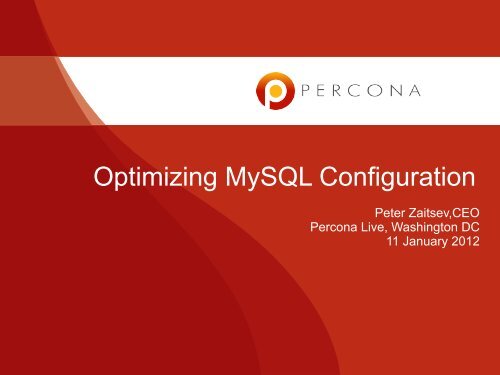Optimizing MySQL Configuration - Percona
Optimizing MySQL Configuration - Percona
Optimizing MySQL Configuration - Percona
Create successful ePaper yourself
Turn your PDF publications into a flip-book with our unique Google optimized e-Paper software.
<strong>Optimizing</strong> <strong>MySQL</strong> <strong>Configuration</strong><br />
Peter Zaitsev,CEO<br />
<strong>Percona</strong> Live, Washington DC<br />
11 January 2012
Agenda<br />
• Approach to getting great <strong>MySQL</strong> <strong>Configuration</strong><br />
• Types of <strong>Configuration</strong> Options<br />
• Tools to Configure <strong>MySQL</strong><br />
• Looking at Most Important Options<br />
www.percona.com
But Before We start<br />
• How many settings do you set in Config File ?<br />
www.percona.com
Also<br />
• How useful do you think <strong>MySQL</strong> Default<br />
<strong>Configuration</strong> ?<br />
www.percona.com
<strong>Configuration</strong> Tuning Basics<br />
• Understand what you're changing<br />
– Google Copy/Paste without thinking can be bad<br />
• Avoid Obsessive Tuning Disorder<br />
– Setting 10 settings will give 95% of possible<br />
performance in 95% cases<br />
• Beware of “Sample Configs” In <strong>MySQL</strong><br />
distributions<br />
– They are pretty outdated<br />
– 2GB of memory is “huge” these days ?<br />
• Right for Cell Phone<br />
www.percona.com
Most Options do not Scale<br />
• Going to Server with 4x memory you can't just<br />
multiply all configuration variables 2x<br />
www.percona.com
Know Scope and Unit<br />
• sort_buffer_size=16G<br />
– Wrong! sort_buffer_size is set per connection<br />
• table_cache=64M<br />
– Wrong! table_cache is set in elements not<br />
memory size.<br />
www.percona.com
Avoid Basic Mistakes<br />
• Setting variables in wrong config file<br />
– /etc/mysql/my.cnf instead of /etc/my.cnf<br />
• These depend on Linux Distro, Beware<br />
• Duplicating Options<br />
– Last option will override previously set<br />
• Not knowing Synonyms<br />
– table_cache is same as table_open_cache<br />
• Using wrong section for option<br />
– Server reads [mysqld], client [mysql]<br />
www.percona.com
Config Management Practices<br />
• Keep Config Files in Sync on different servers<br />
– Out of Sync config files is frequent cause of<br />
mistakes and confusion<br />
• Keep Record of Changes<br />
– Config files under version control is great<br />
www.percona.com
Why would set an option<br />
• Sanity Check Options<br />
– Many do not impact Performance at all<br />
• General Options to set for Hardware and<br />
Workload<br />
– Few of them<br />
• Special Options<br />
– Defaults generally fine, unless your<br />
circumstances are very special<br />
www.percona.com
Do not let <strong>MySQL</strong> Swap<br />
• Allocating too much memory and having <strong>MySQL</strong><br />
swapping is a lot worse than not using all memory<br />
• Monitor swapping (si/so from vmstat closely)<br />
• Start with safe buffer values and increase them<br />
gradually if a lot of memory stays free<br />
www.percona.com
Automated <strong>Configuration</strong> Tuning<br />
• Tools which claim to create best configuration by<br />
looking at status variables<br />
– Beware. Recommendations are often poor<br />
• Advisory Tools<br />
– Tools which check your config file for typical<br />
mistakes and omissions<br />
• Basic configuration creation tools<br />
– Do not claim to do magic but can get your<br />
started with better configuration than default<br />
www.percona.com
mysqtuner<br />
-------- General Statistics --------------------------------------------------<br />
[--] Skipped version check for <strong>MySQL</strong>Tuner script<br />
[OK] Currently running supported <strong>MySQL</strong> version 5.1.57-rel12.8-log<br />
[OK] Operating on 64-bit architecture<br />
-------- Storage Engine Statistics -------------------------------------------<br />
[--] Status: +Archive -BDB -Federated +InnoDB -ISAM -NDBCluster<br />
[--] Data in MyISAM tables: 73G (Tables: 1282)<br />
[--] Data in InnoDB tables: 1G (Tables: 338)<br />
[--] Data in MEMORY tables: 0B (Tables: 2)<br />
[!!] Total fragmented tables: 110<br />
-------- Security Recommendations -------------------------------------------<br />
[!!] User '@' has no password set.<br />
www.percona.com
Mysqltuner (2)<br />
-------- Performance Metrics -------------------------------------------------<br />
• [--] Up for: 157d 10h 0m 23s (533M q [39.219 qps], 8M conn, TX: 1202B, RX:<br />
146B)<br />
• [--] Reads / Writes: 97% / 3%<br />
• [--] Total buffers: 4.3G global + 2.7M per thread (200 max threads)<br />
• [OK] Maximum possible memory usage: 4.8G (40% of installed RAM)<br />
• [!!] Slow queries: 7% (41M/533M)<br />
• [OK] Highest usage of available connections: 54% (109/200)<br />
• [OK] Key buffer size / total MyISAM indexes: 4.0G/1.3G<br />
• [OK] Key buffer hit rate: 100.0% (45B cached / 6M reads)<br />
• [!!] Query cache is disabled<br />
• [OK] Sorts requiring temporary tables: 0% (44K temp sorts / 60M sorts)<br />
• [!!] Joins performed without indexes: 255685<br />
• [!!] Temporary tables created on disk: 41% (25M on disk / 61M total)<br />
• [OK] Thread cache hit rate: 91% (791K created / 8M connections)<br />
• [!!] Table cache hit rate: 2% (1K open / 59K opened)<br />
• [OK] Open file limit used: 32% (2K/8K)<br />
• [OK] Table locks acquired immediately: 99% (436M immediate / 436M locks)<br />
• [!!] InnoDB data size / buffer pool: 1.1G/256.0M<br />
•<br />
www.percona.com
mysqltuner(3)<br />
-------- Recommendations -----------------------------------------------------<br />
• General recommendations:<br />
• Run OPTIMIZE TABLE to defragment tables for better performance<br />
• Adjust your join queries to always utilize indexes<br />
• When making adjustments, make tmp_table_size/max_heap_table_size equal<br />
• Reduce your SELECT DISTINCT queries without LIMIT clauses<br />
• Increase table_cache gradually to avoid file descriptor limits<br />
• Variables to adjust:<br />
• query_cache_size (>= 8M)<br />
• join_buffer_size (> 128.0K, or always use indexes with joins)<br />
• tmp_table_size (> 16M)<br />
• max_heap_table_size (> 16M)<br />
• table_cache (> 4096)<br />
• innodb_buffer_pool_size (>= 1G)<br />
www.percona.com
pt-variable-advisor<br />
• # WARN innodb_flush_log_at_trx_commit-1: InnoDB is not configured in strictly ACID mode.<br />
•<br />
• # NOTE innodb_max_dirty_pages_pct: The innodb_max_dirty_pages_pct is lower than the default.<br />
•<br />
• # NOTE log_warnings-2: Log_warnings must be set greater than 1 to log unusual events such as<br />
aborted connections.<br />
•<br />
• # NOTE max_connect_errors: max_connect_errors should probably be set as large as your platform<br />
allows.<br />
•<br />
• # WARN old_passwords: Old-style passwords are insecure.<br />
•<br />
• # WARN slave_net_timeout: This variable is set too high.<br />
•<br />
• # NOTE innodb_data_file_path: Auto-extending InnoDB files can consume a lot of disk space that is<br />
very difficult to reclaim later.<br />
•<br />
• # WARN myisam_recover_options: myisam_recover_options should be set to some value such as<br />
BACKUP,FORCE to ensure that table corruption is noticed.<br />
•<br />
• # WARN sync_binlog: Binary logging is enabled, but sync_binlog isn't configured so that every<br />
transaction is flushed to the binary log for durability.<br />
•<br />
www.percona.com
tools.percona.com<br />
www.percona.com
Tools.percona.com<br />
www.percona.com
Lets look at the options now<br />
• Different classes of options:<br />
– General Options<br />
– MyISAM<br />
– Innodb<br />
– Visibility and Logging<br />
www.percona.com
Getting Status Variables<br />
• We refer to SHOW GLOBAL STATUS output in<br />
many descriptions<br />
• <strong>Percona</strong> Toolkit too pt-mext is helpful<br />
• pt-mext -r -- mysqladmin ext -i100 -c4<br />
• Aborted_clients 128 0 0<br />
Aborted_connects 909 0 0<br />
Binlog_cache_disk_use 3 0 0<br />
Binlog_cache_use 262857 0 0<br />
Bytes_received 146518902681 580976 459113<br />
Bytes_sent 1202983049426 1417886 1018617<br />
www.percona.com
General Options<br />
• max_connections<br />
– How many connections to allow ? Watch<br />
max_used_connections status value<br />
• thread_cache<br />
– Cache to prevent excessive thread creation<br />
– 50-100 is good value. Watch threads_created<br />
• table_cache/table_open_cache<br />
– Cache of opened table instances<br />
– Single table may have multiple entries<br />
– Watch opened_tables status value<br />
– Start with 4096<br />
• <strong>MySQL</strong> will only use as needed anyway.<br />
www.percona.com
General Options<br />
• open_files_limit<br />
– MyISAM tables require up to 2 file handlers<br />
– Each connection is file handler too<br />
– Safe to set to 65535 in most systems<br />
• table_definition_cache<br />
– Cache table definitions (CREATE TABLE)<br />
– Only one entry per table<br />
– Watch Opened_table_definitions<br />
– Set to cover all tables unless 50K+ tables<br />
www.percona.com
General Options<br />
• back_log<br />
– Need adjustment if many connections/sec<br />
– 2048 is reasonable value<br />
• max_allowed_packet<br />
– Limits maximum size of query<br />
– Limits internal string variable size<br />
– 16MB is a good value<br />
• max_connect_errors<br />
– Prevent password brute force attack<br />
– Can cause “Host Blocked” error messages<br />
– Value around 1000000 is good<br />
www.percona.com
General Options<br />
• skip_name_resolve<br />
– Avoid DNS lookup on connection. Faster and<br />
Safer<br />
– Do not use host names in GRANTs<br />
• old_passwords<br />
– Should NOT be enabled. Will cause insecure<br />
password hash to be used.<br />
www.percona.com
General Options<br />
• log_bin<br />
– Enable for replication and point in time recovery<br />
– Set to “mysql-bin” to avoid default naming<br />
• sync_binlog<br />
– Make Binlog durable. Set to 1 if have RAID<br />
with BBU or Flash<br />
•Can be really performance killer with slow<br />
drives.<br />
• expire_log_days<br />
– Purge old binary logs<br />
– 14 (2 weeks) is a good value with weekly<br />
backups.<br />
www.percona.com
General Options<br />
• tmp_table_size<br />
• max_heap_table_size<br />
– Typically set to same value (workload based)<br />
– Created_tmp_disk_tables status variable<br />
• Bevare BLOB/TEXT fields cause on disk table<br />
with any size.<br />
• query_cache_size<br />
– Enable query cache only if it is tested to provide<br />
significant gains<br />
– Often causes stalls and contention<br />
– Do not set over 512MB<br />
www.percona.com
General Options<br />
• sort_buffer_size<br />
– In memory buffer used for sorting<br />
– Watch sort_merge_passes<br />
– Consider setting for session for large queries<br />
– Values up to 1MB are good default<br />
– Large values hurt performance of small queries<br />
• join_buffer_size<br />
– Helps performance of Joins with no indexes<br />
– Better get rid of such Joins !<br />
– 8MB can be reasonable value<br />
• default_storage_engine<br />
– Use this engine for tables if not specified<br />
www.percona.com
General Options<br />
• read_rnd_buffer_size<br />
– Buffer for reading rows in sorted offer<br />
– Specifies Maximum Value<br />
– Values around 16MB often make sense<br />
– Do not mix with read_buffer_size<br />
• Tmpdir<br />
– Specify location of temporary directory<br />
– Tmpfs often good choice unless very large<br />
temporary space is needed.<br />
www.percona.com
MyISAM options<br />
• key_buffer_size<br />
– Cache MyISAM Indexes.<br />
– Does Not cache data.<br />
– Up to 30% of memory if using MyISAM only<br />
• myisam_recover<br />
– Automatically repair corrupted MyISAM tables<br />
after crash. BACKUP,FORCE is a good value.<br />
• myisam_sort_buffer_size<br />
– Buffer used for building MyISAM indexes by<br />
Sort. 8MB-256MB are good values.<br />
www.percona.com
MyISAM Options<br />
• low_priority_updates<br />
– Allow higher concurrency for SELECTs<br />
– May starve update queries<br />
• bulk_insert_buffer_size<br />
– Buffer to optimize Bulk Inserts<br />
– Values of ¼ of key_buffer_size make sense<br />
– Note it is per connection value<br />
•<br />
www.percona.com
Innodb – Memory Settings<br />
• innodb_buffer_pool_size<br />
–The most important setting. Often 80%+ of<br />
memory is allocated here.<br />
• innodb_buffer_pool_instances<br />
– Reduce contention. Set to 4+ in <strong>MySQL</strong> 5.5+<br />
• innodb_log_buffer_size<br />
– Buffer for log files. Good Values 4MB-128MB<br />
– Not only reduce writes but help contention<br />
• innodb_ibuf_max_size<br />
– Control size of Insert buffer. Default is ½ of<br />
Buffer pool. Smaller values are good for SSD<br />
www.percona.com
Innodb IO Options<br />
• innodb_flush_log_at_trx_commit<br />
– Control Durability<br />
– 1=flush and sync; 2=flush; 0=neither<br />
• Innodb_flush_method<br />
– Controls how Innodb Performs IO<br />
– O_DIRECT good value for most servers<br />
• innodb_auto_lru_dump<br />
– <strong>Percona</strong> Server Feature to warmup quickly<br />
– 300 (seconds) is a good value<br />
• innodb_io_capacity<br />
– Controls Innodb Assumption about Disk<br />
Performance. Increase for faster drives.<br />
www.percona.com
Innodb IO Options<br />
• innodb_read_io_threads<br />
• innodb_write_io_threads<br />
–Control number of threads doing reads and<br />
writes<br />
– <strong>MySQL</strong> 5.5 has async IO so very high values<br />
might not be needed<br />
– 4 is good default. Higher for large IO systems.<br />
• innodb_flush_neighbor_pages<br />
– <strong>Percona</strong> Server feature to control how flushing<br />
works<br />
– Disable (set to 0) for SSD<br />
www.percona.com
Other Innodb Options<br />
• innodb_log_file_size<br />
– Size of redo log file. Larger logs better<br />
performance but longer recovery.<br />
• innodb_log_files_in_group<br />
– Leave at 2 which is default.<br />
• innodb_file_per_table<br />
– Store each Innodb table in separate file. Usually<br />
Good choice<br />
• innodb=force<br />
– Enable so <strong>MySQL</strong> does not start if Innodb could<br />
not initialize. Otherwise it might start but error on<br />
access to all Innodb tables.<br />
www.percona.com
Other Innodb Options<br />
• innodb_data_file_path<br />
– Settings for Innodb System Tablespace<br />
– Use one file. Limit growth as you can't shrink it<br />
– ibdata1:10M:autoextend:max:10G<br />
• innodb_lock_wait_timeout<br />
– How long to wait for row level locks before<br />
bailing out ?<br />
• innodb_old_blocks_time<br />
– Helps to make buffer pool scan resistant<br />
– Values around 1000 make sense<br />
www.percona.com
Other Innodb Options<br />
• innodb_file_format<br />
– Which file format Innodb will use<br />
– “Antelope” is default legacy format<br />
–“Barracuda” allows to use new features like<br />
compression<br />
• innodb_stats_on_metadata<br />
– Update statistics on meta data access<br />
– Such as Information_schema queries<br />
– Typically best disabled for more workloads<br />
•Set to 0<br />
– Innodb will still refresh stats when table<br />
changes significantly<br />
www.percona.com
Visibility Options<br />
• performance_schema<br />
– Enable Performance Schema in <strong>MySQL</strong> 5.5+<br />
– Watch potential overhead.<br />
• log_slow_queries<br />
– Enable Slow Query Log. Old but very helpful.<br />
• long_query_time<br />
– Especially with long_query_time set to 0<br />
periodically to get sample of the load<br />
• log_slow_verbosity=full<br />
– Get a lot more data about queries in <strong>Percona</strong><br />
Server<br />
www.percona.com
Visibility Options<br />
• low_warnings=2<br />
– Get warnings about disconnects and other<br />
minor issues in error log.<br />
– More information but it can get spammy<br />
• userstat_running=1<br />
– Get advanced Table and Index usage statistics<br />
in <strong>Percona</strong> Server and MariaDB<br />
www.percona.com
Summary<br />
• Many Options to chose from !<br />
• And these are selected “few”<br />
• Close to 400 variables available In latest versions<br />
• Remember in most cases you do not need to tune<br />
more than a few<br />
• Consider starting with config file generated by<br />
http://tools.percona.com<br />
– At least it will show you which options to pay<br />
attention to first.<br />
www.percona.com
Main Body Slides<br />
• Use this layout for the main body of your<br />
presentation<br />
• Keep the following slides at the end of your<br />
presentation:<br />
• <strong>Percona</strong> Live DC Sponsors<br />
• Annual <strong>MySQL</strong> Conference & Expo<br />
• <strong>Percona</strong> Training (2 slides)<br />
• Your Contact Information<br />
• <strong>Percona</strong> Live Closing Slide with no text inserted for Q&A<br />
period<br />
www.percona.com
<strong>Percona</strong> Live DC Sponsors<br />
Media Sponsor<br />
Friends of <strong>Percona</strong> Sponsor<br />
www.percona.com
<strong>MySQL</strong> Conference & Expo 2012<br />
Presented by <strong>Percona</strong> Live<br />
The Hyatt Regency Santa Clara & Santa Clara Convention Center<br />
April 10th-12th, 2012<br />
Tutorials & Initial Breakout Sessions Announced<br />
http://www.percona.com/about-us/pressreleases/percona-live-mysql-conferenceand-expo-heads-to-santa-clara-california-april-10-12-2012/<br />
Featured Speakers<br />
Mark Callaghan (Facebook), Jeremy Zawodny (Craigslist), Marten Mickos (Eucalyptus Systems)<br />
Sarah Novotny (Blue Gecko), Peter Zaitsev (<strong>Percona</strong>), Baron Schwartz (<strong>Percona</strong>)<br />
Learn More at www.percona.com/live/mysql-conference-2012/<br />
www.percona.com
Want More <strong>MySQL</strong> Training?<br />
<strong>Percona</strong> Training in Washington DC Next Week<br />
January 16th-19th, 2012<br />
<strong>MySQL</strong> Workshops<br />
<strong>MySQL</strong> Developers Training - Monday<br />
<strong>MySQL</strong> DBA Training - Tuesday<br />
<strong>MySQL</strong> InnoDB / XtraDB - Wednesday<br />
<strong>MySQL</strong> Operations – Thursday<br />
Use Discount code DCPL30 to save 30%<br />
Visit http://bit.ly/dc-training<br />
www.percona.com
Upcoming <strong>Percona</strong> <strong>MySQL</strong> Training<br />
Washington, DC – January 16, 2012<br />
Vancouver, Canada - February 6, 2012<br />
Frankfurt, Germany - February 13, 2012<br />
Irvine, CA – February 14, 2012<br />
Denver, CO - February 20, 2012<br />
San Francisco, CA - March 12, 2012<br />
Austin, TX - March 19, 2012<br />
Visit http://percona.com/training<br />
www.percona.com
Peter Zaitsev<br />
pz@percona.com<br />
We're Hiring!<br />
www.percona.com/about-us/careers/
www.percona.com/live







